-

-
-
2019-2020 Offseason: Post-Selection Follow Up And
Other Revelations
-
-
May 1, 2020 At
11:02 PM CST
By Eric M. Scharf-
- “America’s Team” has concluded
the first draft under the Mike McCarthy coaching regime. Fans who
feared it might have gone sideways instead saw the results as a(n
unexpectedly) masterful dream.
Consistency has been the name of McCarthy’s offseason game, and –
while looks can be deceiving (even for the myopic contingent of
“Cowboys Nation” always unquestionably believing) – the 2020 version
of the Dallas Cowboys appears to be shaping up to be far from the
same.
“Is ‘The Tortured Cowboys Fan’, once again, antagonistically
buttering our toast on both sides in preparation for the most
historic of draft weekend slides? WHAT could possibly go wrong with
an offseason thus-far so seemingly strong?!” you anxiously ask with
nary a hint of sarcasm (hoping Dallas does, in fact, not experience
a selection spasm).
Hey, now. No need to have a cow. You know The Tortured Cowboys Fan
merely exists to “occasionally” remind Cowboys Nation to stop
viewing themselves so imperiously. While every NFL team must always
be on alert for a 3D (Delayed Draft Decision) to no one’s liking –
such as what had twice-previously plagued a team like the Minnesota
Vikings – there were bigger challenges just around the bend on draft
weekend.
The Show Must Go On(line)
While Las Vegas was still undoubtedly getting over the fact that
COVID-19 had killed their event-hosting, money-making pact, the
NFL had been scrambling to establish and test, Test, TEST an
alternative to ensure their second-largest show of the year got
untracked.-
- You must remember the 2020 NFL Draft was entirely remote and – if
the NFL’s carefully connected performance suffered an overwhelming
outage, bandwidth bleed, or (GASP) had been horribly hacked – that
would have been “all they wrote.”
The NFL Media team – along with ESPN and a laundry list of IT
entities (to support their collective work-from-home theme) – had to
concoct a seriously socially-distant digital plan of attack for the
Draft that ultimately involved hundreds of live feeds across the
nation (from players, coaches, GMs, fans, and Commissioner Rodger
Goodell, as well as a certain owner seemingly on a yachting
vacation).
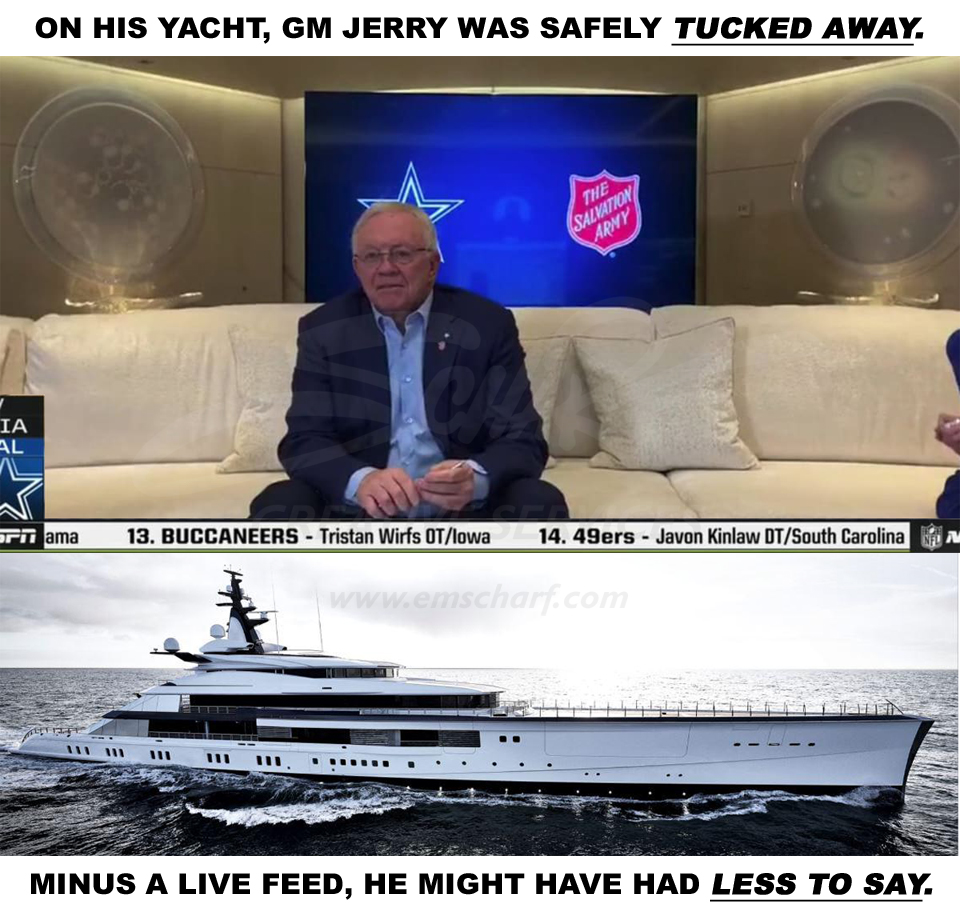 -
-
“In all, there is going to [well] over 600 video feeds that will be
on-air in some fashion at some point. And don’t forget, it’s all
live.” – NFL Media's Dave Shaw (who feverishly extoled his team to
ensure there was perhaps not a single significant flaw).
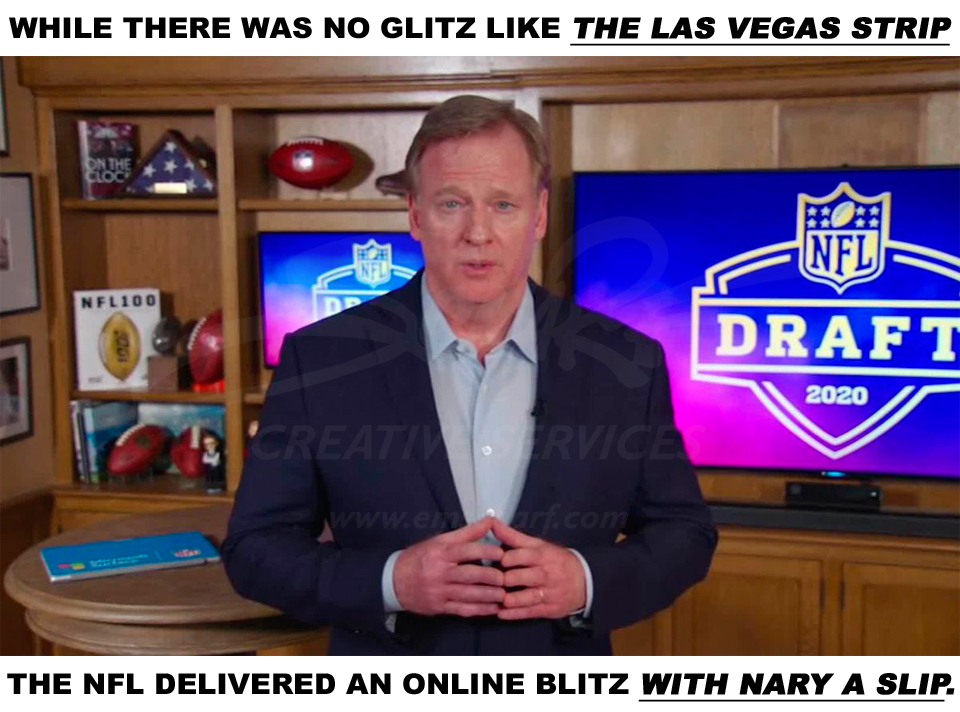 -
-
The show DID go on(line) and the NFL’s latest, greatest production
turned out just fine. Should COVID-19 prove to be as willful as a
young, stubborn teen, the NFL now has a relatively-proven
alternative to nurture well into the future.
The Picks Are In With Little Need To Spin
While two of the Cowboys’ biggest, year-over-Year-over-YEAR needs
remained safety and defensive tackle, there was better-available
draft depth for the latter that would more-immediately shore up what
has been middle man spackle. It remains The Tortured Cowboys Fan’s
steadfast-but-far-from-unique belief that a team should ideally (re)build
a defense from the inside out (quarterback-pressuring defensive line
first, head-hunting linebackers second, and a ball-hawking secondary
third) to best-avoid a performance turd and an opponent’s tremendous
cackle.
Fans expecting Dallas to finally, reasonably engage in a
defensive-heavy set of selections were mentally-prepared for the
Cowboys to potentially trade up or pick Auburn defensive tackle
Derrick Brown, Clemson linebacker Isaiah Simmons, South Carolina
defensive tackle Javon Kinlaw, or LSU defensive end K’Lavon Chaisson.
The reality of another direction, however, began to slowly chip away
at that expectation.
The Carolina Panthers selected Derrick Brown at seven.
The Arizona Cardinals drafted Isaiah Simmons at eight.
The San Francisco 49ers drafted Javon Kinlaw at 14.
Just as Cowboys fans were coming around to the (always
hysterically-entitled) idea that “Chaisson would still be a fine
consolation prize” for Dallas having chosen not to aggressively
pursue the others to fill or freshen roles so long overdue, an
entirely different skill player inconceivably fell into Dallas’
draft day stew.
 -
-
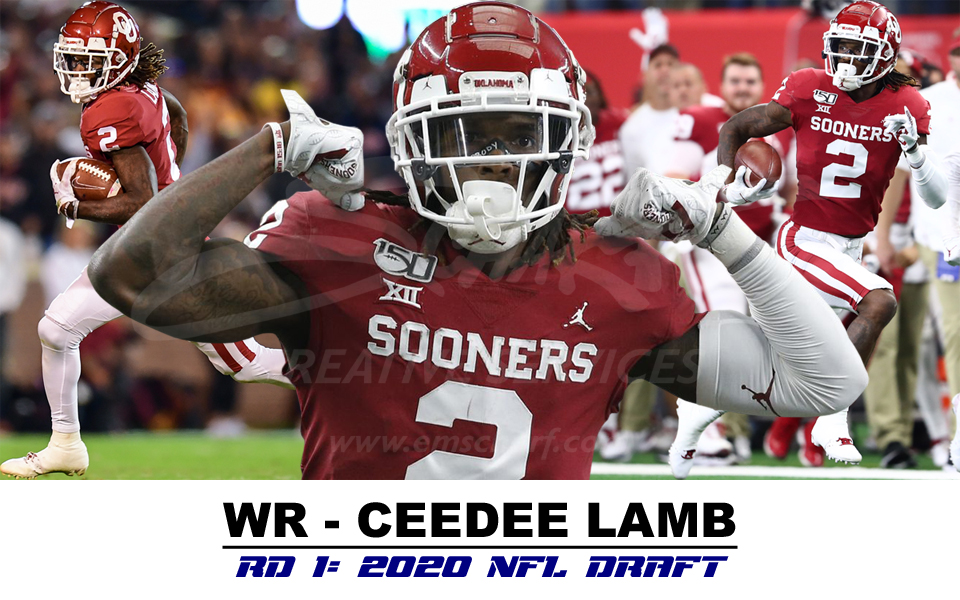 -
-
Dallas’ first round pick arrived – number 17 overall – and 6’2”,
198lb University of Oklahoma wide receiver CeeDee Lamb was their
initial selection at a spot where NOBODY expected him to fall.
When a player of Lamb’s current caliber and powerful potential
appears – inexplicably gift-wrapped and deposited at your draft day
door – it is at that rare moment when you determinately diverge from
your best-laid plans in favor of procuring the “Best Player
Available” (with talent so unassailable) at a position where (some)
fans insist “There is simply NO ROOM FOR MORE!”
As a three-year starter and consensus All-American at Oklahoma, Lamb
maintained quite the productive aroma. He led the 2020 draft class
with 15.1 yards per target, an average of 11.0 YAC (Yards After
Catch), and the endurance to consistently break (opposing) ankles in
open space with a Tavon-Austin-like agility yet (with a 4.50-second
40 time) absent his blazing speed ability. Lamb reliably defeats
jamming defenders at the line of scrimmage with Amari-like
quick-twitch feet and hands. He can pull off Gallup-like circus
catches and finish like an Olympic gymnast seemingly no matter where
he lands.
“Are the Cowboys CRAZY?! Did their re-signing of Amari Cooper for
$100M make their eagle-eyed draft day vision somehow cataract hazy?”
you exclaim (seeing blood after watching Dallas’ expected shot at a
defensive stud seemingly slide right into the gutter of their
first-round frame). No, the Cowboys – known for intensely-improved
draft day decisions over the past decade – were not going out of
their way to trigger dismay or make tart lime juice from sweet
lemonade. Dallas saw an opportunity to overwhelm opposing defenses
by realistically (more than just possibly) being able to go
three-deep with number one receiver skills similarly to a handful of
past NFL teams who also delivered three-headed receiving thrills.
“Three-headed?” you quizzically inquire. Yes, teams with three
different receivers (no matter the position) who each simultaneously
accumulated 1,000+ yards in a single season and – in doing so – set
opposing defenses on fire.
The 1980 San Diego Chargers had Dan Fouts throwing to wide receivers
Charlie Joiner and John Jefferson along with tight end Kellen
Winslow, Sr.
The 1989 Washington Redskins had Mark Rypien throwing to “The Posse”
with wide receivers Gary Clark, Art Monk, and Ricky Sanders.
The 1995 Atlanta Falcons had Jeff George throwing to scat back and
special teams ace Eric Metcalf along with wide receivers Bert
Emanuel and Terance Mathis.
The 2004 Indianapolis Colts had Peyton Manning throwing to wide
receivers Reggie Wayne, Marvin Harrison, and Brandon Stokley.
The 2008 Arizona Cardinals had Kurt Warner throwing to wide
receivers Larry Fitzgerald, Anquan Boldin, and Steve Breaston.
The 2020 Dallas Cowboys may, might, could, should, would have a
righteously re-signed Dak Prescott throwing to Amari Cooper, Michael
Gallup, and CeeDee Lamb (along with change-up of Ezekiel Elliott or
Tony Pollard in the backfield and Blake Jarwin occasionally down the
seam). Such a lineup so spread – assuming a re-anchored “Great Wall”
enjoying a reasonable wealth of health – sounds like a Dallas dream
for many an opponent to dread.
YES, Yes, yes, “when you assume, you make an ass out of (yo)u and
me,” but there is nothing seedy about the selection of CeeDee.
"And, AND" if fans think THAT is enticing, could an unimaginable
reconciliation with Dez Bryant be the sickeningly-sweet icing (on a
cake that fans might surely take)?
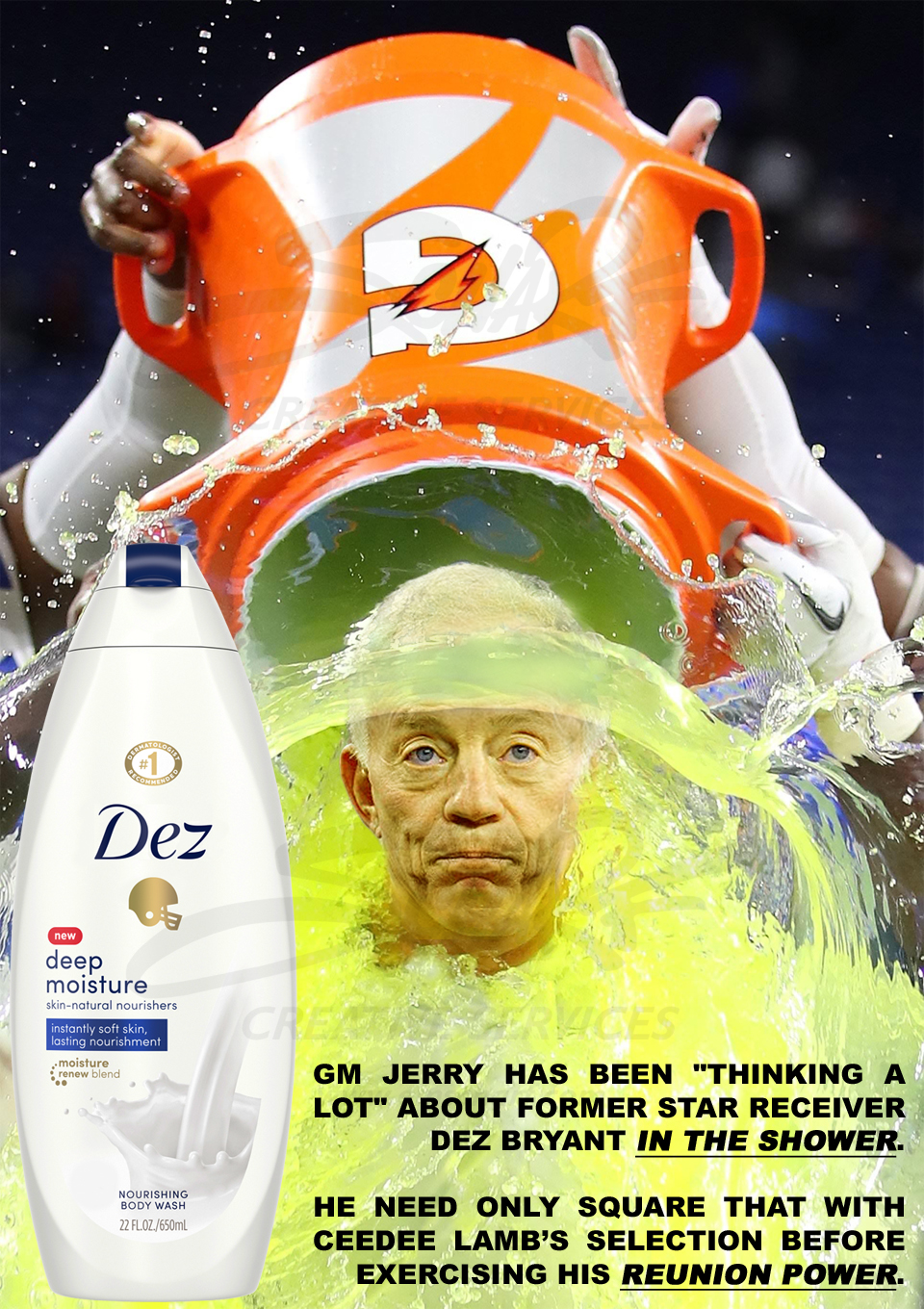 -
-
“I have been thinking about [Dez Bryant] a lot in the shower. It
should not be dismissed. I'm thinking about it.” – GM Jerry (at the
NFL Scouting Combine in late February).
“I’m where I need to be right now. I’m more serious than ever. I’m
100-percent hungry for the right situation [in Dallas].'' – Dez
Bryant (two years into his unplanned off-time, looking and feeling
sublime).
“He has texted me [and Jerry] about wanting to come back. You know
what we think of Dez. And we're always in the player-evaluation
business [though the concept of re-upping with such a post-Cowboys
antagonist might cause some dizziness].'' – Stephen Jones
(acknowledging the slim possibility of the Cowboys choosing to
invite Bryant back into the fold and roll the bones).
 -
-
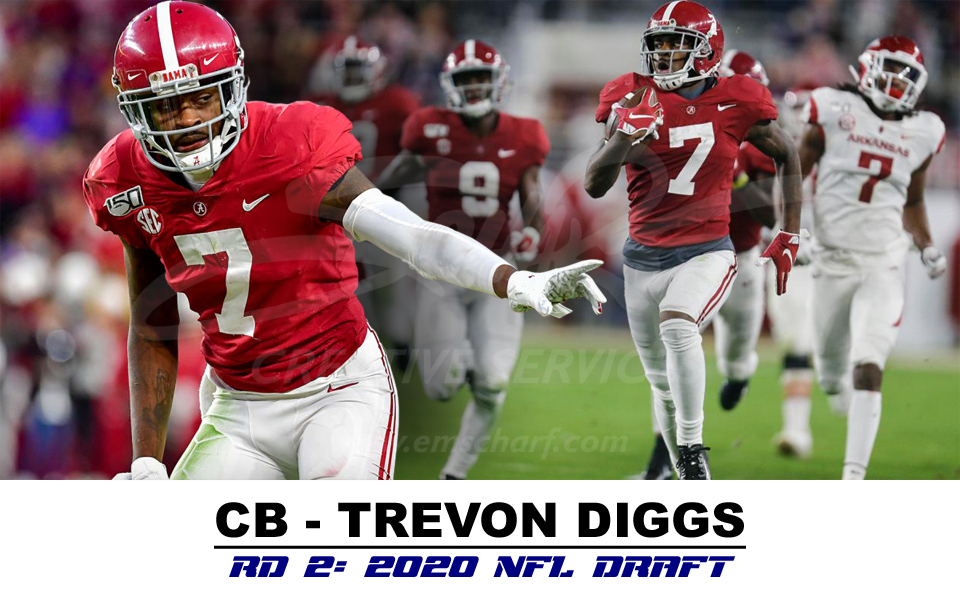 -
-
Before a certain sector of Cowboys Nation could begin to fantasize
(about the Cowboys possibly trading up to make Chaisson one of their
d-line guys), there was another unexpectedly-available surprise a
patient Dallas brain trust would soon realize.
Dallas’ second round pick arrived – number 51 overall – and 6’1”,
205lb University of Alabama defensive back Trevon Diggs was proudly
selected to enlarge a Dallas secondary that has routinely come up
small.
Trevon – also known as Stefon Diggs’ younger brother – is a larger,
athletic, prototypical cornerback (with the desired wingspan for
Mike Nolan’s preferred attack and) who knows how to organically
(rather than robotically) cover. Time will tell if Diggs (quickly or
eventually) becomes the heir apparent to Byron Jones (absent the
ball-hawking restrictions). Fans (if allowed by fate to believe
their eyes) should appreciate Diggs as an immediate upgrade and one
of the best guys for a secondary that has routinely struggled to (at
least compete for and at most) produce interceptions.
“What do you mean if allowed by fate?” you quizzically ask (before
remembering one sure-fire player who failed to fulfill his
first-round task). Morris Claiborne – who has faced a mix of earned
and unfair scorn (over which frustrated fans are never torn) – was
the first cornerback drafted (by the Cowboys) in 2012. Unlike
Terence Newman (whom Dallas drafted fifth overall in 2003), it was
Claiborne’s highly-anticipated Cowboys career that an onslaught of
injuries would shelve.
While Cowboys Nation has been historically spoiled by
largely-successful secondaries (typically sporting at least one
deceptive defensive back who believes all passes belong to him and
one devastating safety who leaves opponents feeling dim), there has
been no aerial anticipation or exciting suspense for the “rear end”
of a Dallas defense that – pretty consistently over the past 25
years – has been unable to significantly switch gears.
Whether or not Trevon Diggs ultimately evokes momentary (or mammoth)
memories of potent past players (fulfilling both turnovers dreams
and – perhaps – some returns on special teams), his addition to this
year’s group of would-be aerial assassins could and should produce a
significant increase in fan cheers.
 -
-
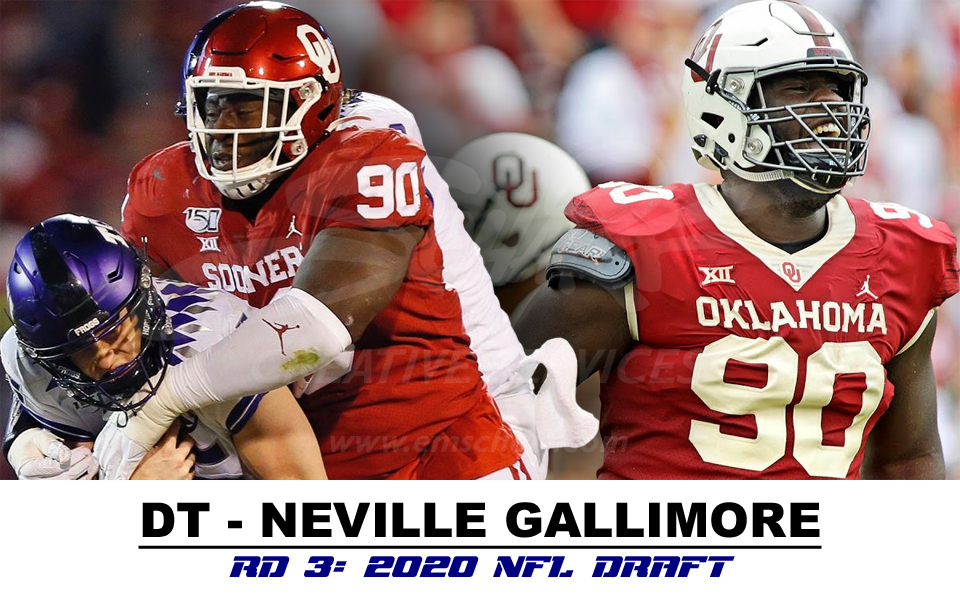 -
-
Dallas’ third round pick arrived – number 82 overall – and 6’2”,
304lb University of Oklahoma defensive tackle Neville Gallimore was
eagerly engaged to rebuild a Dallas defensive line interior that has
increasingly been inferior when it was time to play stout football.
Their second selected Sooner on the day has a violently-quick first
step with the size, speed, athleticism, and precious DURABILITY to
allow this defensive crooner to make some long-sought middle man
hay. While his reach could be a touch longer, his non-stop motor
makes his full-throttle pursuit (of quarterbacks and tailbacks) that
much stronger. His technique – from 1 to 3 and left to right – gives
him multiple angles from which to help his fellow defensive linemen
win the ground game fight.
Gallimore joins a “rag tag fugitive fleet” of imperfect bridge
trolls in Tyrone Crawford, Trysten Hill, and Antwaun Woods, as well
as free agent additions Gerald McCoy and Dontari Poe. It may,
indeed, take a magical mix of natural skill, high octane hustle, and
a productively-creative scheme (of which fans continue to dream)
before THIS particular position group finally, consistently leaves
running backs nowhere on their “bridge” to go.
 -
-
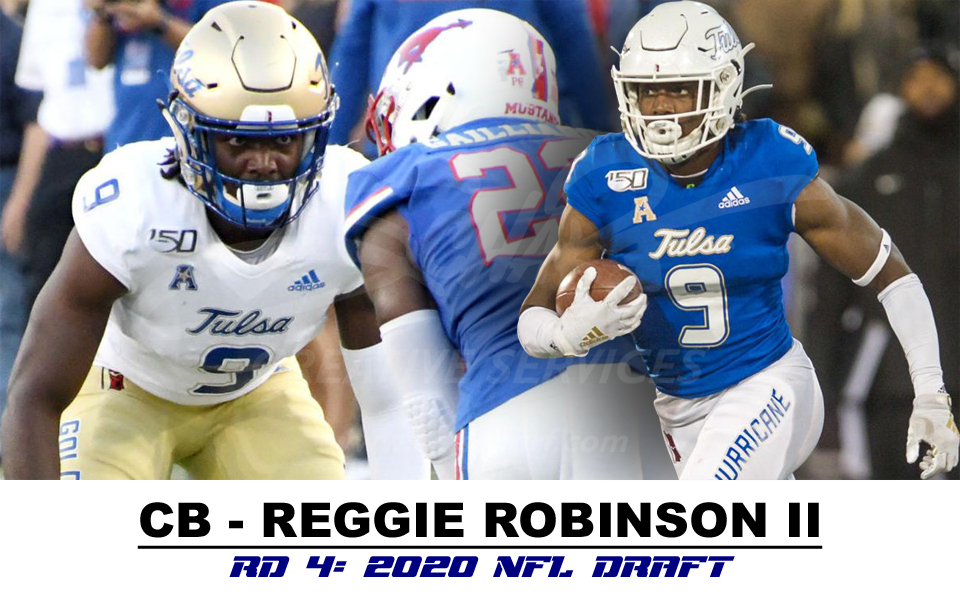 -
-
Dallas’ fourth round pick arrived – number 123 overall – and 6’1”,
205lb University of Tulsa cornerback Reggie Robinson
(talented-yet-raw) was intercepted to further extend the Cowboys'
long(er) arm of the law and potentially increase their secondary's
ability to answer the aerial call.
Robinson certainly has the prototypical size, strength, and speed
attributes, though time will tell if such a pet project (?) ever
regularly and routinely contributes (with troublesome technique and
a faulty left ear into which signal-calling teammates dare not
speak). Reggie made his productive bones in a zone-heavy scheme
against decidedly “division-1-lite” AAC (American Athletic
Conference) receivers but – perhaps with enough practice laps and
preseason snaps – he may turn his new team into playing-time
believers.
 -
-
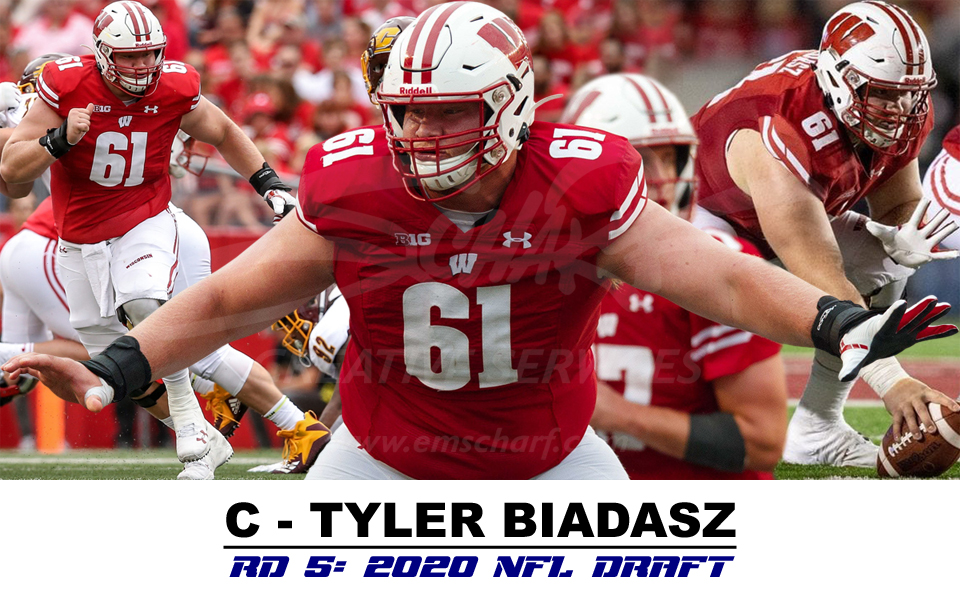 -
-
Dallas’ fifth round pick arrived – number 146 overall – and 6’2”,
318lb University of Wisconsin center Tyler Biadasz was the hopeful
result of a trade for a player whom the Cowboys could develop into
their future offensive line anchor (a position at which Dallas can
ill-afford a stall).
While Biadasz was (and is) widely viewed as having a high football
IQ (including multiple blocking schemes to have successfully played
through), Travis-Frederick-like grip strength, and
relatively-efficient technique, he fell in the draft due to (knee
and hip) injury concerns of which the increasingly-injury-jinxed
Cowboys dare not speak. Though he has a less appealing lower
ceiling, it is because of his solid floor that Biadasz (save – GULP
– untimely injury) will not be shown the preseason waiver door.
While those physical issues were clearly not scary enough (in
Dallas’ eyes) to cut Biadasz down to (undrafted free agent) size,
The Tortured Cowboys Fan sees a loose-but-still-applicable
similarity with former Dallas Cowboys offensive guard Ronald Leary
(whose degenerative-knee-related 2012 draft tumble looked to be
terminal, at least in theory). Ronald’s eight-year career (having
prematurely finished a financially-rewarding stop with the Denver
Broncos) has gone seven seasons longer than most reasonable analysts
expected. More rocky mountain injuries (beyond his balky knee) may
have ensured – no matter how many post-draft tryouts – that a career
continuation is ultimately rejected.
Time will tell if Biadasz’s physical durability turns out just
swell.
 -
-
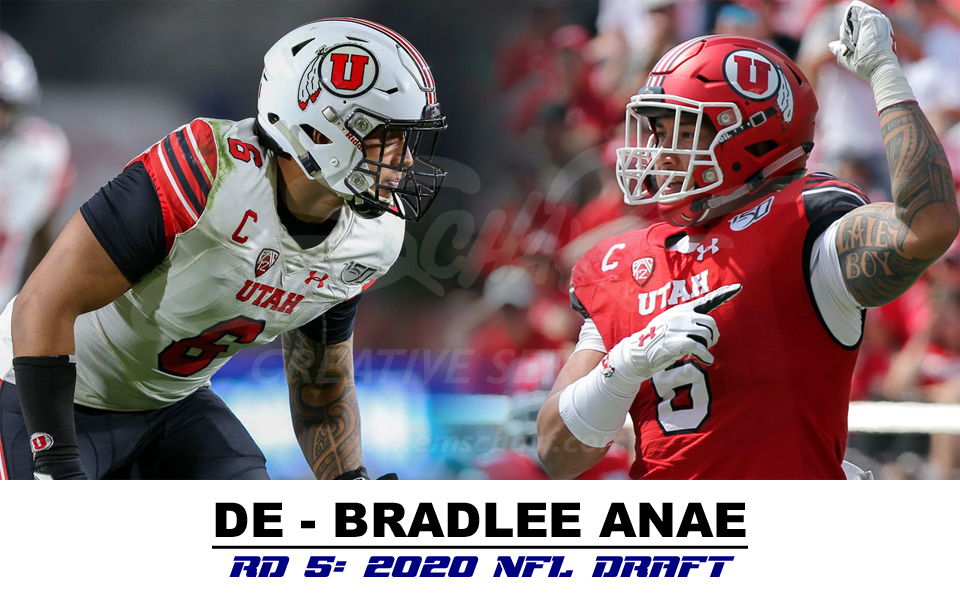 -
-
Dallas’ second fifth round pick arrived – number 179 overall – and
6’3”, 257lb University of Utah defensive end Bradlee Anae was
another high motor musher, nasty 'tude gusher, relentless edge
rusher who may sooner than later be able to help a deep defensive
line rotation really maul. He would increasingly swing for the
fences as a member of one of college football’s better defenses.
Anae – for his alleged lack of prototypical tools or refinements –
spent each year of his college career forcing opposing offenses to
further adjust their blocking assignments. Anae – as a result of his
hustle and high football IQ – may prove a ready-made (quarterback
and intermediate route) attacker, perhaps built for Mike Nolan’s
hybrid 3-4 as solid linebacker who knows what to do.
The Tortured Cowboys Fan admittedly wonders if Nolan’s
interpretation of “hybrid” might just be flexible enough for Anae to
seek additional success through the WIDE 9 technique (like one-time
Philadelphia Eagle Connor Barwin and the 2014 havoc he did wreak).
 -
-
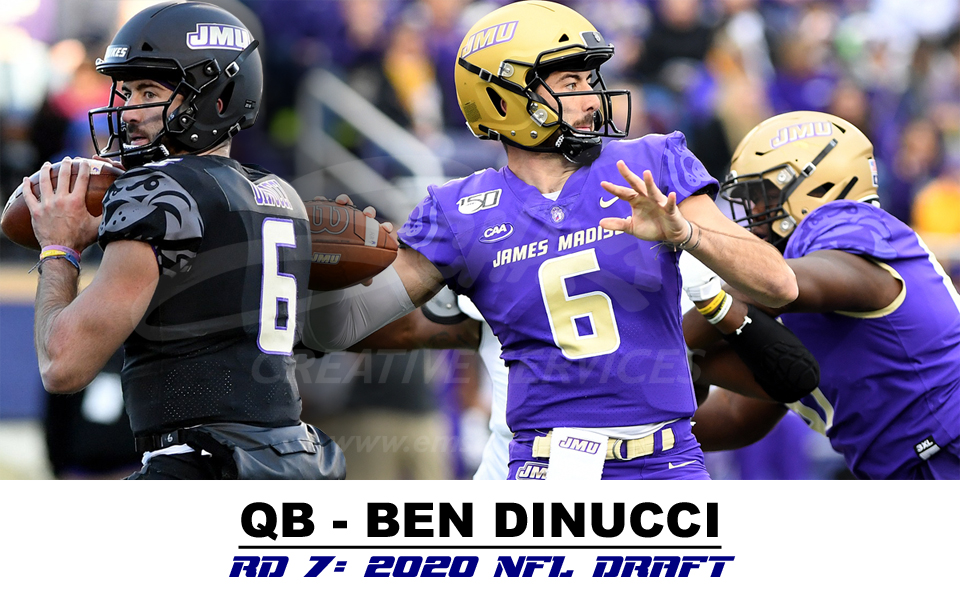 -
-
Dallas’ seventh pick arrived – number 231 overall – and 6’3”, 210lb
James Madison University quarterback rounded out the Cowboys' draft
day haul.
Though McCarthy has consistently maintained a keen interest in young
quarterbacks to develop – whether for an eventual, down-the-road
need or to stop a(n always-unexpected) talent bleed – his outcomes
have never involved players around which even reasonable success
could envelop. Outside the "momentary might" of one Matt Flynn, none
of McCarthy's other pet projects (from Brian Brohm to Brett Hundley)
ever earned their bench-warming money or calmed enough coaching
fears to solve what (for the better part of eight years) had become
a back-up QB sin.
McCarthy’s prior pet project history – along with Dak Prescott
remaining unsigned and Cooper Rush being unable to competitively
hush (an opposing throng) – made the selection of DiNucci a curious
mystery (and the latest to eventually go wrong?).
Nonetheless, McCarthy allegedly had his eyes on one of three
potential targets (two of whom would originate from the Badger
state): Florida International’s James Morgan, University of Iowa’s
Nate Stanley, and James Madison University's Ben DiNucci.
While the New York Jets plucked Morgan in the fourth round, Dallas
was drafting Reggie Robinson, zeroing in on Tyler Biadasz (whom
they, again, hope is their latest o-line middle man), and their plan
was sound.
“[DiNucci] Reminds me of a young Marc Bulger [former Rams QB and
one-time Kurt Warner understudy], someone that just, as you look for
comparables, he is a young man that has played the position his
whole life. He will be an excellent addition to our quarterback
room." – Mike McCarthy in explaining his preference to groom DiNucci
over Morgan and Stanley (who, yes, when put together creates a
banking resemblance so uncanny).
DiNucci spent 2015-2017 with the Pitt(sburgh) Panthers, but his poor
results (55.7% completion rate, 6.9 yards per attempt, six
touchdowns, and seven interceptions) did not fit (and left DiNucci
searching for answers). Upon transferring to James Madison, however,
DiNucci exploded for 45 touchdowns against a “mere” 18 interceptions
across 2018 and 2019, scrambling for an additional 1,002 rushing
yards and 16 more touchdowns along the way towards a total
collective production that turned out marvelously mean.
While it is too late to determine whether DiNucci was confused or
restricted (at Pitt) as seemingly depicted, or if the opposite
(versus simply lesser competition) was true at JMU, it is now on
Mike McCarthy and Kellen Moore to discover what really occupies
DiNucci’s competitive core.
After Party So Hearty?
Once the 2021 NFL Draft was clearly done, the afterparty (so
typically hearty) had begun. All 32 NFL teams were free and clear to
court still tens of hundreds more players of the undrafted sort. A
narrow cross section of such raw-yet-talented players may, MAY prove
to have been grossly overlooked, and they will (at least threaten
to) display plenty of rookie game day revenge to ensure those teams
(that were blind to their value) are rudely and repeatedly
overcooked.
Reported or rumored signings include most of the following dudes:
RB – Sewo Olonilua, Texas Christian University
DT – Garrett Marino, University of Alabama at Birmingham
DE – Ladarius Hamilton, University of North Texas
LB – Francis Bernard, University of Utah
TE – Sean McKeon, University of Michigan
WR – Aaron Parker, University of Rhode Island
RB – Rico Dowdle, University of South Carolina
DE – Ron’Dell Carter, James Madison University
WR – Stephen Guidry, Mississippi State University
SS – Luther Kirk, Illinois State University
OT – Terence Steele, Texas Tech University
TE – Charlie Taumoepeau, Portland State University
DE – Azur Kamara, Kansas State University
WR – Kendrick Rogers, Texas A&M University
RB – Darius Anderson, Texas Christian University
While most teams looked (and continue) to eagerly collect ‘em all in
exchange for monetary sums so conveniently small, there is, of
course, a side effect to adding 10-15 more diamonds in the rough (or
capable camp bodies) with training camp approaching. The
NFL-mandated requirement to reduce the number of roster spots down
to a temporarily-altered (?) 80 – rather than the normal 90 – which
(given time and the ever-present specter of injury) may quickly
become encroaching. For every new player you attract (assuming a
roster fully stacked), a pre-existing player you must subtract.
Will They Or Won’t They?
If fans and prognosticators thought the 2020 NFL Draft was
challenging or unusual, the oncoming OTAs, training camp, preseason,
regular season, and postseason should prove just as intriguing (or
frightening) for parties both serious and casual.
While COVID-19 has clearly not stopped at 15 people and faded away,
will steps be taken around the country (and around the world) to
help ensure it does not get further in the way?
Will each of the major North American sports leagues enact
potential-and-creative measures to protect their financial treasures
(to perhaps sidestep the need to say their prayers for both eager
fans and tough guy players)?
Will the television networks need to develop a plan of blackout
flexibility to ensure reasonable viewership sustainability?
Will the coming weeks and months be “business as usual” for the NFL
league office and all 32 of its member organizations, or will they
find themselves increasingly having to treat workouts, film study,
coaching of new concepts, and practices as a series of video-conferenced
staycations?
We shall see. We always do.
|